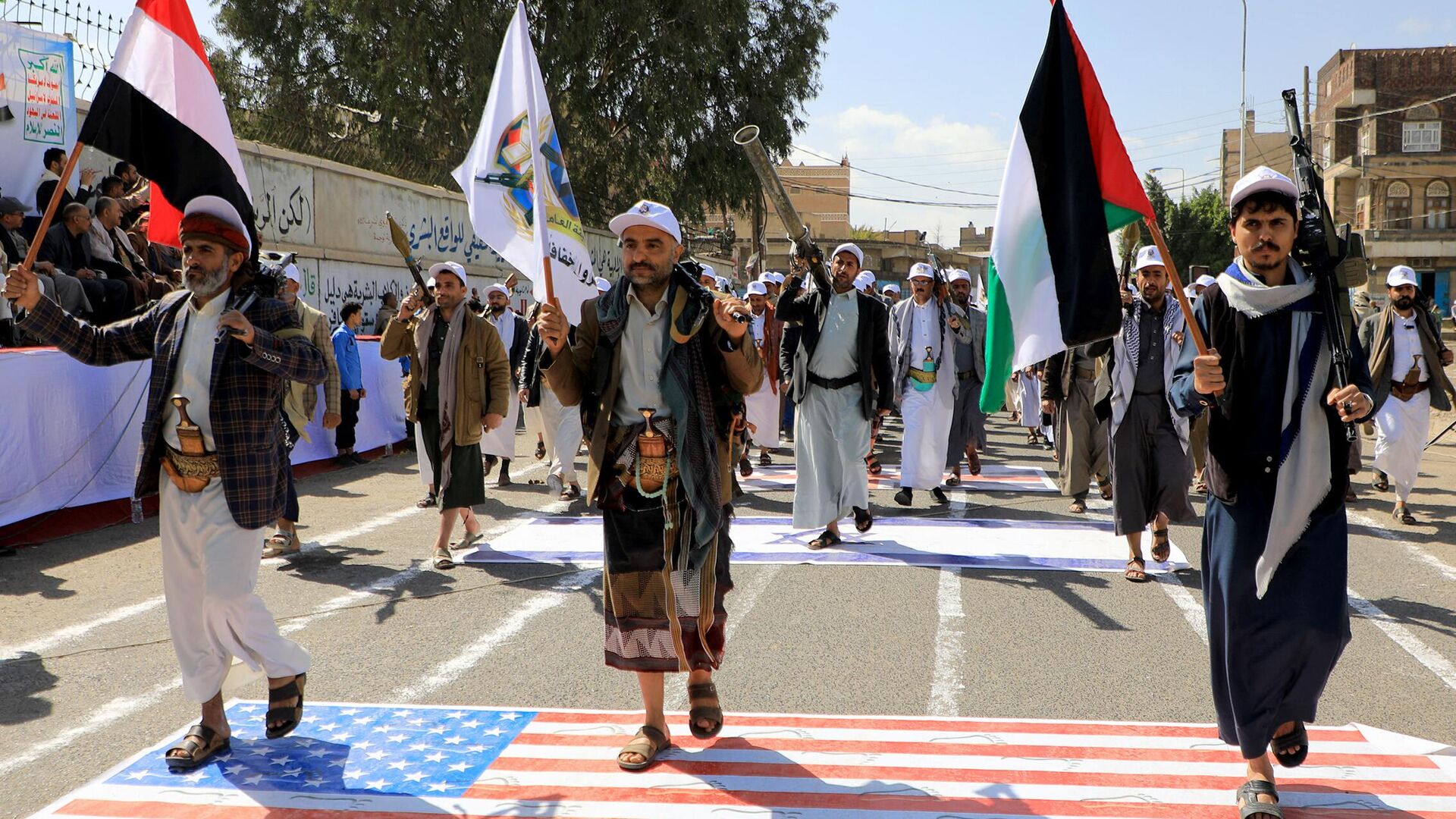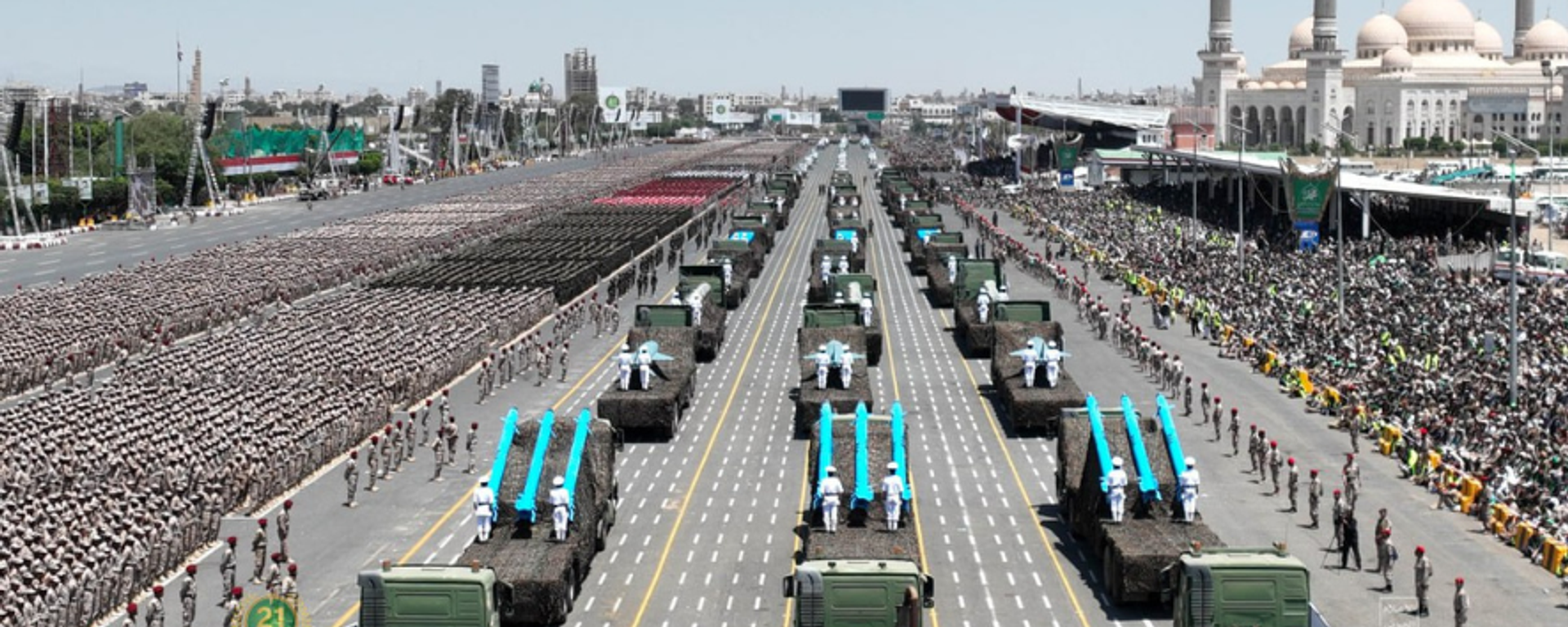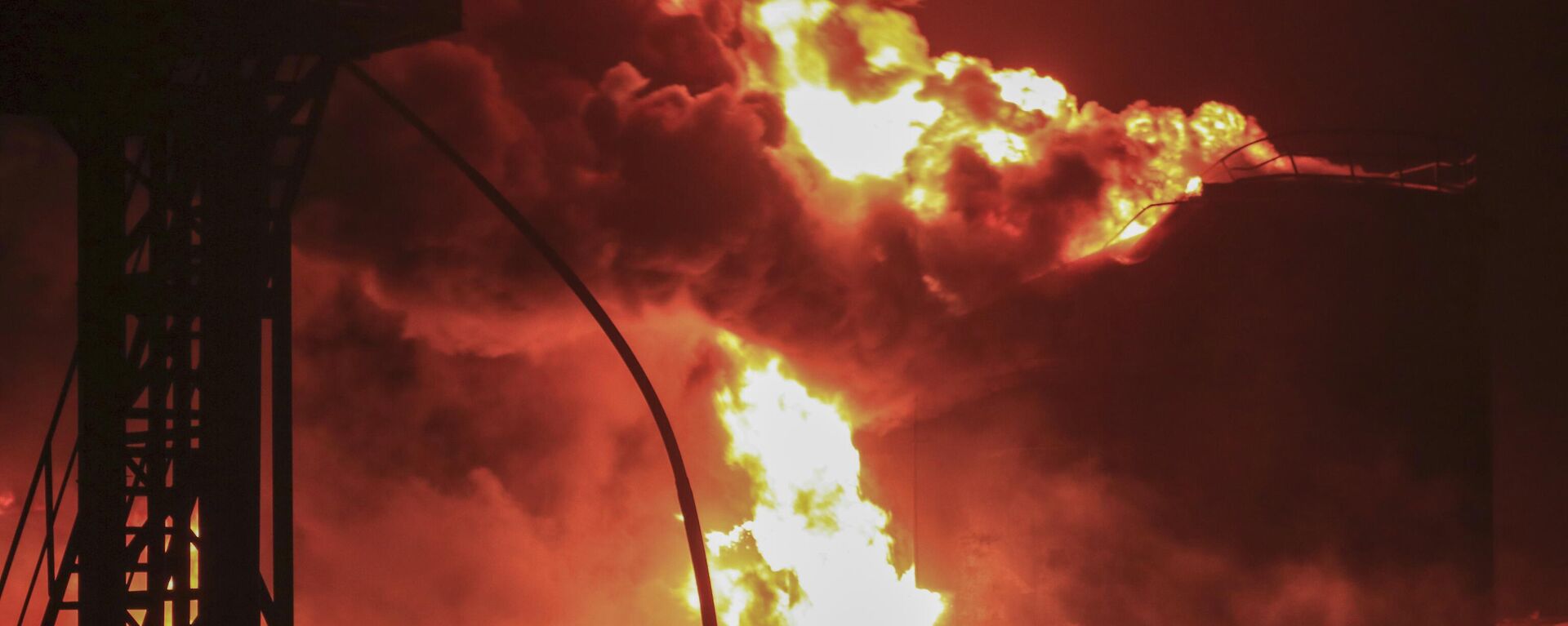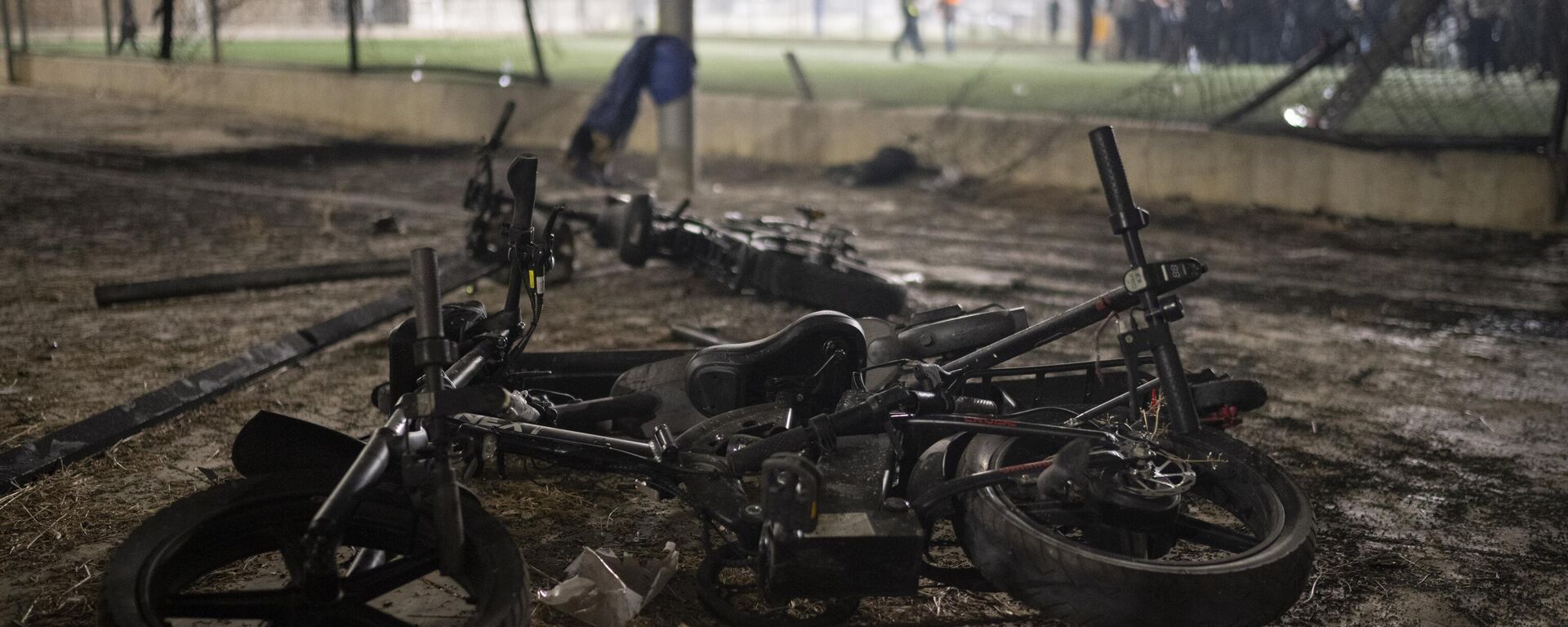https://sputnikglobe.com/20240728/houthis-announce-new-stage-of-conflict-with-israel-urge-arab-and-muslim-states-to-unite-1119547463.html
Houthis Announce ‘New Stage’ of Conflict With Israel, Urge Arab and Muslim States to ‘Unite’
Houthis Announce ‘New Stage’ of Conflict With Israel, Urge Arab and Muslim States to ‘Unite’
Sputnik International
Yemen is entering a “new stage” of its war with Israel, and is asking Arab and Muslim countries to unite to help wage it, Houthi political bureau member Ali al-Qahoum has told Sputnik.
2024-07-28T16:32+0000
2024-07-28T16:32+0000
2024-07-28T16:32+0000
world
middle east
palestinians
israel
red sea
yemen
houthi
houthis
israel defense forces (idf)
muslims
https://cdn1.img.sputnikglobe.com/img/07e8/07/1c/1119547247_0:118:2268:1394_1920x0_80_0_0_f5da78c50fb7fe8c0c33b8d70dee8364.jpg
Yemen is entering a “new stage” of its war with Israel, and is asking Arab and Muslim countries to unite to help wage it, Houthi political bureau member Ali al-Qahoum has told Sputnik.“Yemen and its leader are entering a new stage of conflict, new alliances are being created that do not have red lines,” Al-Qahoum said.Al-Qahoum’s language signals a marked escalation in the militia’s position, which at the beginning of its Red Sea semi-blockade and missile attacks on Israel last October and November was aimed at “standing in solidarity” with Palestinians with a view to stopping the now more than nine-month old war in Gaza.The Houthi political bureau member has not shied away from using increasingly sharp rhetoric in interviews in recent months, warning Washington in January that Yemen would become America’s “graveyard” and that the US would be forced to “leave the region in humiliation” after the US and British navies launched a campaign of air and missile strikes inside Yemen.In March, al-Qahoum said the Houthis were “cooperating” with the rising powers in the world to “drown America and the West in the mire around the Red Sea, to get them bogged down, weaken[ed] and unable to maintain unipolarity.”Tensions between the Houthis and Israel escalated dramatically over the past week after the militia flew a long-range airplane-style combat drone into Tel Aviv on July 19, evading Israel’s powerful air defenses in an incident the IDF attributed to “human error.” One person was killed in the attack, and seven were injured.Israel reacted by launching F-35I jets to target the western Yemeni Red Sea port city of al-Hudaydah on July 20, targeting the port’s oil facilities and a power plant. The attacks were meant to make “it clear to our enemies that there is no place that the long arm of Israel will not reach,” Prime Minister Benjamin Netanyahu said. At least nine people were killed and 87 others injured in the Israeli attack, according to local authorities.In a televised speech on Thursday, Houthi leader Abdul Malik al-Houthi vowed that Yemen’s response was “inevitable.”The regional escalation that began last October with Hamas’s surprise raid into southern Israel from Gaza expanded to the Red Sea on November 19, when the Houthis seized an Israeli shipping magnate’s ro-ro car transporter and began a campaign of drone and missile attacks on merchant ships with suspected links to Israel, partially paralyzing the flow of shipping through the region.Northern EscalationIn recent weeks, the region has faced further tensions in the face of repeated Israeli threats to launch a major military operation against Hezbollah amid regular skirmishes with the militia on the Israeli-Lebanese border. The risk of a full-scale conflict increased dramatically on July 27, when a soccer field in the town of Majdal Shams in the Israeli-occupied Golan Heights was struck by a projectile, killing a dozen or more children and teens and injuring scores more.Majdal Shams is populated mostly by the Druze – an ancient Arabic-speaking ethnoreligious group which has largely refused Israeli citizenship, rejected conscription and held regular protests demanding that their land be returned to Syria.Israel’s military has said that the projectile which landed in Majdal Shams was a Hezbollah rocket. The militia denied the claims, with regional media citing an alledged eyewitnesses as saying an Israeli Iron Dome interceptor rocket may have caused the carnage.Israeli media have asked why the IDF’s Northern Command did not issue an early warning to residents to take cover, as typically occurs when an incoming missile or rocket threat is detected.
https://sputnikglobe.com/20240719/yemen-is-doing-what-gulf-states-should-have-1119436971.html
https://sputnikglobe.com/20240721/iran-hold-israel-us-for-potential-spillover-from-attacks-on-yemen-1119449895.html
https://sputnikglobe.com/20240728/israeli-foreign-ministry-announces-last-chance-to-prevent-war-with-lebanon-1119539863.html
israel
red sea
yemen
Sputnik International
feedback@sputniknews.com
+74956456601
MIA „Rossiya Segodnya“
2024
News
en_EN
Sputnik International
feedback@sputniknews.com
+74956456601
MIA „Rossiya Segodnya“
Sputnik International
feedback@sputniknews.com
+74956456601
MIA „Rossiya Segodnya“
why are houthis fighting israel, who is fighting israel right now, who has israel attacked, who has attacked israel
why are houthis fighting israel, who is fighting israel right now, who has israel attacked, who has attacked israel
Houthis Announce ‘New Stage’ of Conflict With Israel, Urge Arab and Muslim States to ‘Unite’
The Yemeni militia has escalated its campaign against Israel in stages, seizing and targeting merchant ships off the Yemeni coast, firing long-range ballistic missiles at the Israeli Red Sea port city of Eilat, and, most recently, slamming a heavy drone into a building in downtown Tel Aviv about 100 meters from the US consulate.
Yemen is entering a “new stage” of its war with Israel, and is asking Arab and Muslim countries to unite to help wage it, Houthi political bureau member Ali al-Qahoum has told Sputnik.
“Yemen and its leader are entering a new stage of conflict, new alliances are being created that do not have red lines,” Al-Qahoum said.
“As long as Israel exists, there will be no peace – this is an existential battle. It is time to unite Arabs and Muslims, use their opportunities and stand together in this battle to preserve the identity of Islam and Arabism in the face of the challenges, dangers and projects of the Great Satan represented by America and Israel,” the official said, using the derogatory epithet originating from the 1979 Islamic Revolution in Iran and typically referring to the United States.
Al-Qahoum’s language signals a marked escalation in the militia’s position, which at the beginning of its Red Sea semi-blockade and missile attacks on Israel last October and November was aimed at “standing in solidarity” with Palestinians with a view to stopping the now more than nine-month old war in Gaza.
The Houthi political bureau member has not shied away from using increasingly sharp rhetoric in interviews in recent months, warning Washington in January that Yemen would become America’s “graveyard” and that the US would be forced to “leave the region in humiliation” after the US and British navies launched a campaign of air and missile strikes inside Yemen.
In March, al-Qahoum said the Houthis were “cooperating” with the rising powers in the world to “drown America and the West in the mire around the Red Sea, to get them bogged down, weaken[ed] and unable to maintain unipolarity.”
Tensions between the Houthis and Israel escalated dramatically over the past week after the militia
flew a long-range airplane-style combat drone into Tel Aviv on July 19, evading Israel’s powerful air defenses in an incident the IDF attributed to “human error.” One person was killed in the attack, and seven were injured.
Israel reacted by launching F-35I jets to target the western Yemeni Red Sea
port city of al-Hudaydah on July 20, targeting the port’s oil facilities and a power plant. The attacks were meant to make “it clear to our enemies that there is no place that the long arm of Israel will not reach,” Prime Minister Benjamin Netanyahu said. At least nine people were killed and 87 others injured in the Israeli attack, according to local authorities.
The Houthis have vowed to respond to the tit-for-tat escalation, with Houthi spokesman Mohammed Abdulsalam, saying last week that Israel’s “brutal aggression will only increase the determination and steadfastness of the Yemeni people and their brave armed forces, continuing and escalating their support for Gaza.”
In a televised speech on Thursday, Houthi leader Abdul Malik al-Houthi vowed that Yemen’s response was “inevitable.”
The regional escalation that began last October with Hamas’s surprise raid into southern Israel from Gaza expanded to the Red Sea on November 19, when the Houthis seized an Israeli shipping magnate’s ro-ro car transporter and began a campaign of drone and missile attacks on merchant ships with suspected links to Israel, partially paralyzing the flow of shipping through the region.
In recent weeks, the region has faced further tensions in the face of repeated Israeli threats to launch a major military operation against Hezbollah amid regular skirmishes with the militia on the Israeli-Lebanese border. The risk of a full-scale conflict increased dramatically on July 27, when a soccer field in the town of Majdal Shams in the Israeli-occupied Golan Heights was struck by a projectile, killing a dozen or more children and teens and injuring scores more.
Majdal Shams is populated mostly by the Druze – an ancient Arabic-speaking ethnoreligious group which has largely refused Israeli citizenship, rejected conscription and held regular protests demanding that their land be returned to Syria.
Israel’s military has said that the projectile which landed in Majdal Shams was a Hezbollah rocket. The militia denied the claims, with regional media
citing an alledged eyewitnesses as saying an Israeli Iron Dome interceptor rocket may have caused the carnage.
Israeli media have
asked why the IDF’s Northern Command did not issue an early warning to residents to take cover, as typically occurs when an incoming missile or rocket threat is detected.





